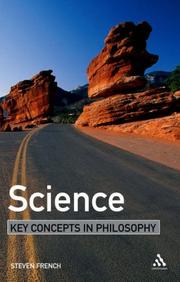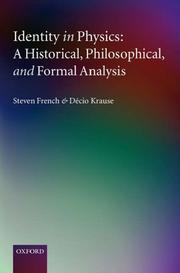| Listing 1 - 10 of 26 | << page >> |
Sort by
|

ISBN: 9780826486554 082648655X 9780826486547 0826486541 Year: 2007 Publisher: London: Continuum,
Abstract | Keywords | Export | Availability | Bookmark
 Loading...
Loading...Choose an application
- Reference Manager
- EndNote
- RefWorks (Direct export to RefWorks)
Key Concepts in Philosophy is a series of concise, accessible and engaging introductions to the core ideas and subjects encountered in the study of philosophy. Specially written to meet the needs of students and those with an interest in, but little prior knowledge of, philosophy, these books open up fascinating, yet sometimes difficult ideas. The series builds to give a solid grounding in philosophy and each book is also ideal as a companion to further study. The philosophical questions raised by the history and practice of science are among the most complex and stimulating. The philosophy of
Philosophy of science --- Science --- Philosophy. --- Knowledge. --- Science -- Philosophy. --- Science. --- Humanities --- Natural Science Disciplines --- Information Science --- Disciplines and Occupations --- Knowledge --- Philosophy --- Physical Sciences & Mathematics --- Sciences - General --- Science - Philosophy.
Book
ISBN: 9781474245241 9781474245234 1474245234 1474245242 Year: 2016 Publisher: London: Bloomsbury,
Abstract | Keywords | Export | Availability | Bookmark
 Loading...
Loading...Choose an application
- Reference Manager
- EndNote
- RefWorks (Direct export to RefWorks)
Science has made a huge impact on human society over hundred years, but how does it work? How do scientists do the things they do? How do they come up with the theories? How do they test them? How do they use these theories to explain phenomena? How do they draw conclusions from them about how the world might be? Now updated, this second edition of Philosophy of Science: Key Concepts looks at each of these questions and more. Taking in turn the fundamental theories, processes and views lying at the heart of the philosophy of science, this engaging introduction illuminates the scientific practice and provides a better appreciation of how science actually works. Succinct and approachable, Philosophy of Science: Key Concepts outlines some of the most central and important scientific questions, problems and arguments without assuming prior knowledge of philosophy. This enjoyable introduction is the perfect starting point for anyone looking to understand how and why science has shaped and changed our view of the world.
Science --- Philosophy --- Science - Philosophy
Book
ISBN: 0198776667 0191507725 0199684847 0191765139 9780191507724 1306474108 9781306474108 Year: 2014 Publisher: Oxford : Oxford University Press,
Abstract | Keywords | Export | Availability | Bookmark
 Loading...
Loading...Choose an application
- Reference Manager
- EndNote
- RefWorks (Direct export to RefWorks)
Steven French articulates and defends the bold claim that there are no objects in the world. He draws on metaphysics and philosophy of science to argue for structural realism - the position that we live in a world of structures - and defends a form of eliminativism about objects that sets laws and symmetry principles at the heart of ontology.
Metaphysics. --- God --- Ontology --- Philosophy --- Philosophy of mind
Book
ISBN: 9781441187611 1441187618 Year: 2011 Publisher: London: Continuum,
Abstract | Keywords | Export | Availability | Bookmark
 Loading...
Loading...Choose an application
- Reference Manager
- EndNote
- RefWorks (Direct export to RefWorks)
Science --- Normal science --- Philosophy of science --- Philosophy
Book
ISBN: 9780198776666 9780199684847 Year: 2016 Publisher: Oxford Oxford University Press
Abstract | Keywords | Export | Availability | Bookmark
 Loading...
Loading...Choose an application
- Reference Manager
- EndNote
- RefWorks (Direct export to RefWorks)
Book
ISBN: 9780198848158 Year: 2020 Publisher: Oxford Oxford university press
Abstract | Keywords | Export | Availability | Bookmark
 Loading...
Loading...Choose an application
- Reference Manager
- EndNote
- RefWorks (Direct export to RefWorks)
Book
ISBN: 9780198897958 Year: 2022 Publisher: Oxford Oxford university press
Abstract | Keywords | Export | Availability | Bookmark
 Loading...
Loading...Choose an application
- Reference Manager
- EndNote
- RefWorks (Direct export to RefWorks)

ISBN: 0199278245 9780199278244 0191603953 0199575630 9786611164799 0191535222 1281164798 1435631234 9780199575633 Year: 2006 Publisher: Oxford: Clarendon,
Abstract | Keywords | Export | Availability | Bookmark
 Loading...
Loading...Choose an application
- Reference Manager
- EndNote
- RefWorks (Direct export to RefWorks)
Can quantum particles be regarded as individuals, just like books, tables and people? According to the 'received' view - articulated by several physicists in the immediate aftermath of the quantum revolution - quantum physics itself tells us they cannot : quantum particles, unlike theirclassical counterparts, must be regarded as 'non-individuals' in some sense. However, recent work has indicated that this is not the whole story and that the theory is also consistent with the position that such particles can be taken to be individuals, albeit at a metaphysical price. Drawing on philosophical accounts of identity and individuality, as well as the histories of both classical and quantum physics, the authors explore these two alternative metaphysical packages. In particular, they argue that if quantum particles are regarded as individuals, then Leibniz's famousPrinciple of the Identity of Indiscernibles is in fact violated. Recent discussions of this conclusion are analysed in detail and, again, the costs involved in saving the Principle are carefully considered. Taking the alternative package, the authors deploy recent work in non-standard logic and set theory to indicate how we can make sense of the idea that objects can be non-individuals. The concluding chapter suggests how these results might then be extended to quantum field theory. Identity in Physics brings together a range of work in this area and further develops the authors' own contributions to the debate. Uniquely, as the title indicates, it situates this work in the appropriate formal, historical, and philosophical contexts.
Physics --- Identity (Philosophical concept) --- Individuality. --- Philosophy. --- Individuality --- Philosophy --- Identity --- Psychology --- Conformity --- Identity (Psychology) --- Likes and dislikes --- Personality --- Self --- Comparison (Philosophy) --- Resemblance (Philosophy) --- Physics - Philosophy. --- Physics - Philosophy
Book
ISBN: 9781472527592 1472527593 Year: 2014 Publisher: London: Bloomsbury,
Abstract | Keywords | Export | Availability | Bookmark
 Loading...
Loading...Choose an application
- Reference Manager
- EndNote
- RefWorks (Direct export to RefWorks)
"The Bloomsbury Companion to the Philosophy of Science presents a practical and up-to-date research resource to the philosophy of science. Addressing fundamental questions asked by discipline - areas that have continued to attract interest historically, as well as recently-emerging areas of research - this volume provides a comprehensive and up-to-date overview of the philosophy of science. Specially-commissioned essays from an international team of experts reveal where important work continues to be done in the area and the exciting new directions the field is taking. The Companion explores issues pertaining to the philosophy of specific sciences (physics, biology, neuroscience, economics, chemistry and mathematics) and general issues in the field, such as explanation, realism, representation, evidence, reduction, laws, causation and confirmation. Featuring a series of indispensable research tools, including an A to Z of key terms and concepts, a chronology, a detailed list of resources and a fully annotated bibliography, The Bloomsbury Companion to the Philosophy of Science the essential reference tool for anyone working in philosophy of science today"--
Book
ISBN: 9780198814979 Year: 2020 Publisher: Oxford : Oxford university press,
Abstract | Keywords | Export | Availability | Bookmark
 Loading...
Loading...Choose an application
- Reference Manager
- EndNote
- RefWorks (Direct export to RefWorks)
Quantum theory explains a hugely diverse array of phenomena in the history of science. But how can the world be the way quantum theory says it is? Fifteen expert scholars consider what the world is like according to quantum physics in this volume and offer illuminating new perspectives on fundamental debates that span physics and philosophy.
Physics --- Quantum theory --- Philosophy.
| Listing 1 - 10 of 26 | << page >> |
Sort by
|

 Search
Search Feedback
Feedback About UniCat
About UniCat  Help
Help News
News